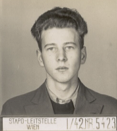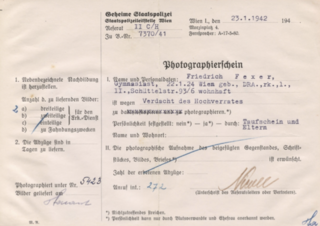Dr. Friedrich Fexer

Personalia
Born:
Died:
Profession:
Persecution:
Landgraf resistance group
Imprisonment 20.01.1941 - 17.10.1944,
Punishment company 17.10.1944 until the end of the war
Memberships
Curriculum Vitae
Friedrich Fexer is the second of five children born to a teacher couple. After his father contracted polio in adulthood, he was paralyzed and received a small disability pension, leaving the family in poverty. Despite this, Friedrich Fexer was able to attend grammar school after elementary school. His father was German nationalist, while his mother was Catholic. Friedrich Fexer was a member of the "Jungvolk" of the Vaterländische Front until 1938.
After the occupation of Austria by Hitler's Germany, he transferred from the Breitensee grammar school, which was converted into a "National Political Academy", to the grammar school at Kundmanngasse 22 in Vienna's 3rd district. He transfers to the class in which, among others, Josef Maria Landgraf, Ludwig Igáli von Igálffy, Anton Brunner and Johann Trettler are his classmates.
Josef Maria Landgraf was able to win Friedrich Fexer's cooperation. Together with his classmates Ludwig Igáli von Igálffy, Johann Trettler, Anton Brunner and Josef Maria Landgraf, he set up a network to post the letters and distribute the flyers and stickers. Around 70 letters, 50 flyers and 20 stickers were produced.
Another classmate of the five fellow pupils, who had learned of their activities, contacted the principal of Kundmanngasse, Ferdinand Walter, who reported the pupils to the Gestapo. On September 20, 1941, Josef Maria Landgraf was arrested by the Gestapo. Ludwig Igáli von Igálffy and Friedrich Fexer were arrested on January 19, 1942 and Anton Brunner was finally arrested on January 20, 1942.
[Note: Johann Trettler was not arrested, especially as he had already been drafted into the Wehrmacht at the time he should have been arrested and the Wehrmacht refused to hand him over to the Gestapo. Johann Trettler died on September 26, 1942 in the Caucasus region.]
Friedlich Fexer was sentenced to six years in prison by the People's Court on August 28, 1942 for "preparation for high treason". He is transferred to the Kaiser-Ebersdorf youth prison. On October 17, 1944, he was transferred from there to a punishment company ("probation battalion") of the Wehrmacht. There he lived to see the end of the war.

"During his police interrogation on January 19, 1942, Fexer explained his motives by stating that he was 'oppositional' to the National Socialist state. [...] In fact, the Secret State Police [...] found and seized a number of anti-state poems and treatises during the search of Fexer's father's apartment. It can therefore be assumed that Fexer was already anti-state due to his upbringing at home."
Places
Place of activity:
Residence:
Memorial:
Citations
- Dokumentationsarchiv des österreichischen Widerstands (DÖW)
- Josef Landgraf (2021): Die weiße Rose von Wien. Geboren 1924 (Wien)
- Manfred Pawlik (2014): Friedrich Fexer. Widerstand und Widerstandspädagogik (Wien)
